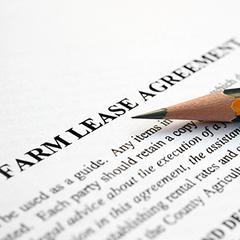Store Locator
Store Locator
The following information is provided by Nationwide®, the #1 farm and ranch insurer in the U.S.1

For generations, a handshake sealed the deal for most farmland leases. But today, long-term land productivity, growing competition, and high costs make it important to sign a written lease.
A lease defined
A written farm lease is a contract that transfers to a lessee the right to use a property for a specified purpose in a defined time frame. It includes key details for both the farmland owner and lessee. Farmland leases are renewed at the same time each year. In the Midwest, it typically happens in the fall and applies to the following crop year.
Why a lease is important for the lessee
A written lease is like an insurance policy for farmland for a specified time frame. It enables annual crop rotation planning and facilitates long-term land improvements. With a long-term lease in hand, a lessee has the assurance that he or she can reap the rewards of a shared investment to make improvements. This includes things like installing drainage tile that helps improve potential crop productivity.
How a written lease benefits the landowner
A written lease also helps manage risk for the landowner. The document normally spells out specific liabilities and responsibilities. Contractual risk transfer is a critical function of a written farm lease. The lessee typically becomes responsible for operating liabilities during the time frame spelled out in the lease. Identifying and accounting for these variables in writing is key to managing risk for both parties and should be reviewed by your legal representation.
What to include in a farmland lease
The duration and price paid by the lessee are foundational to every lease. Also include:
Qualities of land that affect lease rates
Typically, land that is used for high-value crops can demand a higher rental rate than land for commodity crops or pasture. But other variables contribute to rental rates, including:
Consult your farm’s trusted advisers when drafting a new land lease
Account for all specific variables that could influence each lease’s liabilities for both landowner and lessee before signing. Consult with your farm’s team of trusted advisers in drafting your next farm lease. That includes your lender, accountant, attorney, and insurance provider.
Visit AgInsightCenter.com for resources and expert tips on trending topics to help you run a successful business and maintain the safety of your operation.
[1] *A.M. Best Market Share Report 2022.
Nationwide, the Nationwide N and Eagle, and Nationwide is on your side are service marks of Nationwide Mutual Insurance Company. © 2023 Nationwide